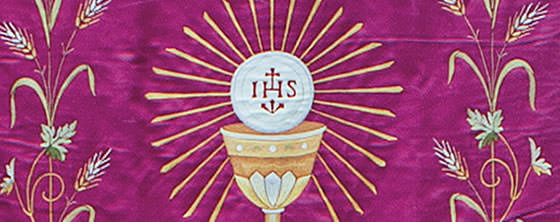On the final day of his three-day pilgrimage to the Holy Land in May 2014, Pope Francis celebrated Mass in the Upper Room—the Cenacle—in Jerusalem. In his homily he referred to the power of the gift Jesus left us through the Eucharist.


Here in the Upper Room is where Jesus shared the Last Supper with the apostles; where, after his resurrection, he appeared in their midst; where the Holy Spirit descended with power upon Mary and the disciples. Here the church was born, and was born to go forth. From here she set out, with the broken bread in her hands, the wounds of Christ before her eyes, and the Spirit of love in her heart.
These words followed on from his catechesis on the Eucharist given at his general audiences over three weeks in February. Here is part of this catechesis:
What we see when we gather to celebrate the Eucharist, the Mass, already gives us an intuition of what we are about to live. At the centre of the space intended for the celebration there is an altar, a table covered with a tablecloth, and this makes us think of a meal or a banquet. On the table there is a cross to indicate that on this altar what is offered is the sacrifice of Christ. Beside the table is the ambo, the place from which the Word of God is proclaimed. This indicates that we gather there to listen to the Lord who speaks through Sacred Scripture, and therefore the food that we receive is also his Word.
Word and Bread in the Mass become one, as at the Last Supper, when all the words of Jesus and all the signs he had performed were condensed into the gesture of breaking the bread and offering the chalice, in anticipation of the sacrifice of the cross, and in those words, ‘Take, eat; this is my body … Take, drink; for this is my blood.’
‘Thanksgiving’ in Greek is expressed as ‘eucharist’. The Eucharist is thus the supreme giving of thanks to the Father, who so loved us that he gave us his Son out of love. As such, the Eucharistic celebration is much more than a simple banquet: it is the memorial of Jesus’ Paschal sacrifice, the mystery at the centre of salvation. The Lord Jesus, by becoming bread broken for us, pours upon us his mercy and love, so as to renew our hearts, our lives, and our way of relating with him and with others.
We can’t ever thank the Lord enough for the gift he has given us in the Eucharist! It is a great gift and that is why it is so important to go to Sunday Mass.
When we go to Mass, how do we live it? Is it only a moment of celebration, an established tradition, an opportunity to find oneself or to feel justified, or is it something more? There are very specific signals for understanding how we live the Mass: signals that tell us if we are living the Eucharist in a good way or not very well.

The first indicator is our way of looking at or considering others. At Mass, we find ourselves with all sorts of men and women: young people, the elderly, children; poor and well-off; locals and strangers alike; people with their families and people who are alone. But does the Eucharist lead me to feel they are all like brothers and sisters? Does it increase my capacity to rejoice with those who are rejoicing and cry with those who are crying? Does it urge me to go out to the poor, the sick, the marginalised? Does it help me to recognise in theirs the face of Jesus?
A second indication is the grace of feeling forgiven and ready to forgive. We go to Mass because we are sinners and we want to receive God’s pardon, to participate in the redemption of Jesus, in his forgiveness. The Last Supper took place ‘on the night he was betrayed’ (I Corinthians 11:23). In the bread and in the wine the gift of Christ’s body and blood is renewed every time for the remission of our sins. We go to Mass humbly, like sinners, and the Lord reconciles us.
A last indication comes to us from the relationship between the Eucharistic celebration and the life of our Christian communities. It is precisely an act of Christ! It is Christ who acts there, on the altar. It is a gift of Christ, who makes himself present and gathers us around him, to nourish us with his Word and with his Life.
This means that the mission and the very identity of the church flows from there—from the Eucharist. A celebration may be flawless on the exterior, very beautiful, but if it does not lead us to encounter Jesus Christ it is unlikely to offer any kind of nourishment to our heart and our life. Through the Eucharist, Christ wishes to enter into our life and permeate it with his grace, so that in every Christian community there may be coherence between liturgy and life.